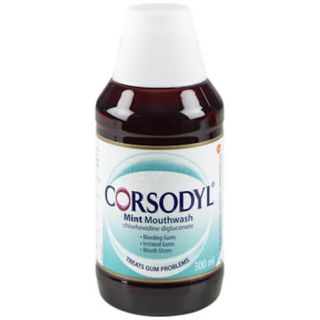
Dental Care
Having a great smile isn’t just good for your confidence – it’s important for your health too. Your teeth help you to chew and digest food, they’re essential for speech and they give your face shape. But neglecting your dental care can give you bad breath, tooth decay, mouth ulcers and even lead to oral cancers. To keep your smile bright and your teeth healthy make sure you brush daily and visit the dentist for regular check-ups. Some people are at higher risk of dental issues but with extra treatments and the right care we can all keep our teeth healthy.
Dental Care Treatments
 Corsodyl (Chlorhexidine) Dental Gel£4.79
Corsodyl (Chlorhexidine) Dental Gel£4.79
Duraphat Fluoride Toothpaste
Duraphat Fluoride Toothpaste£14.99
Corsodyl Mouthwash Mint
Corsodyl Mouthwash Mint£5.99
Start your assessment for Dental Care
Don't wait to get the medical help you need.
Once you complete a short online assessment about your condition, you will be able to select your preferred treatment and quantity from a list of appropriate options for you.
- Reviewed by our UK-based medical team
- Takes less than 3 minutes to complete
- Approved treatments dispatched same day (before 3pm)
Ordering as easy as 1, 2, 3
1. Find the ideal treatment
2. Get a free consultation
3. Enjoy speedy delivery
Advice for Dental Care
What is Dental Care?
Dental or oral care refers to the process and routine of keeping your teeth, gums and tongue healthy. On the most basic level, this should involve brushing your teeth at least twice a day and seeing a dentist regularly.
When dental care and hygiene fail this can lead to problems such as dental cavities and gum disease. If these issues are not addressed this can result in more serious complications such as tooth loss or removal, root canals and even oral cancers.
Tooth decay and gum disease most commonly happen as a direct result of plaque being left to build up upon the teeth and gum line. Plaque is a film of bacteria that creates a layer over the teeth and releases acids. It is this acid that then attacks the enamel on the teeth causing holes or cavities to develop.
If plaque is not removed it hardens and becomes what is known as ‘tartar’ that releases bacteria into the gums causing them to become swollen, infected and even resulting in the teeth falling out or needing to be permanently removed.
Who is at an Increased Risk of Developing Dental Problems?
For the majority of people adopting basic oral care can help prevent serious dental problems, however, there are certain groups of people who may be at an increased risk of developing dental and oral problems.
These groups include those with:
- Exposed roots
- A high-sugar diet
- A dry mouth
- Orthodontic appliances such as braces
- A previous history of tooth decay
- Difficulties using a manual toothbrush
- Smokers
For these groups of people, basic dental care alone may not be enough to prevent decay and gum disease and they may require further treatments to help maintain good oral health.
What are the Symptoms of Tooth Decay and Gum Disease?
Although there are certain things that you can do to help prevent tooth decay and gum disease it is a good idea to be aware of the symptoms of these problems and to seek advice from a qualified dentist as soon as possible to reduce the chances of further complications.
Symptoms of tooth decay:
- Toothache – this may be continuous pain or occasional sharp pain without an obvious cause
- Tooth sensitivity – tenderness or pain when eating or drinking something hot, cold or sweet
- Grey, brown or black spots appearing on your teeth
- Bad breath
- An unpleasant taste in your mouth
Symptoms of gum disease:
- Red and swollen gums
- Bleeding gums after brushing or flossing your teeth
- Bad breath
- An unpleasant taste in your mouth
- Loose teeth
- Abscesses
What Can You Do To Keep Your Teeth Healthy?
To minimise your chances of developing dental problems you must try to keep your teeth and mouth clean to maintain good oral health. There are a few simple things everyone should do. These include:
- Brush your teeth twice a day with a toothbrush and toothpaste that contains fluoride for at least 2 minutes.
- Use dental floss or interdental brushes to dislodge small bits of food. This will help prevent tooth decay and bad breath.
- See a dentist for regular checkups. Your dentist will be able to recommend how often you should attend appointments as this can range from several months to every 2 years. If you are not currently registered with a dentist you can search for NHS dentists online here.
What should you do to avoid dental problems?
There are also several lifestyle changes that people can make that can help to improve their dental health. These factors include:
- Reducing your intake of sugary foods including food and drinks with added sugar as well as fruit juices and smoothies.
- Give up smoking if you currently smoke. Smoking not only yellows the teeth but is also a common cause of bad breath and gum disease in adults.
- Reducing your intake of alcohol. Alcohol can erode the enamel on the surface of your teeth increasing your chances of cavities. If you smoke and drink alcohol this also significantly increases your chances of developing mouth cancers.
What Medicines Can Be Used To Help Aid Good Dental Health?
At The Independent Pharmacy, we currently stock a prescription-strength fluoride toothpaste known as Duraphat Flouride Toothpaste. This is a great product for adults who are at higher risk of dental decay to offer additional protection.
Duraphat not only helps to protect teeth against decay it also repairs and strengthens teeth that have already undergone some damage. It should be used 3 times a day to brush the teeth instead of regular toothpaste.
Corsodyl Dental Gel and Corsodyl Mouthwash can be used to help prevent tooth decay and gum disease, aiding the healing process of damaged gums including mouth ulcers by targeting bacteria, viruses and fungi that can cause problems in the mouth.
Corsodyl Gel can be used once or twice a day and applied to the mouth using a toothbrush or applied using a clean finger to the specific problem area. Corsodyl Mouthwash can be used daily to rinse the mouth after brushing.